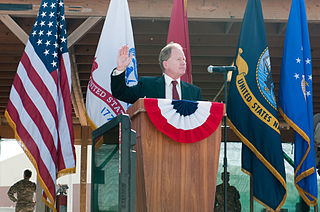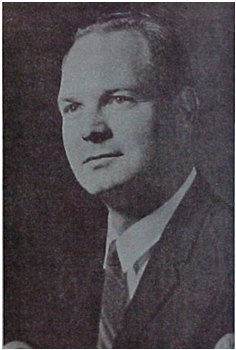
Janet Wood Reno was an American lawyer and public official who served as the first female and 78th United States attorney general. Reno,a member of the Democratic Party,held the position from 1993 to 2001,making her the second-longest serving attorney general,behind only William Wirt.

The United States Immigration and Naturalization Service (INS) was an agency of the U.S. Department of Labor from 1933 to 1940 and the U.S. Department of Justice from 1940 to 2003.
Thomas Alexander Aleinikoff is executive dean of The New School for Social Research and University Professor at The New School in New York City. He was previously director of the Zolberg Institute on Migration and Mobility at The New School and a law professor and dean at Georgetown University Law Center in Washington,D.C. From 2010 to 2015,Aleinikoff was the Deputy High Commissioner in the Office of the United Nations High Commissioner for Refugees in Geneva,Switzerland. In 2016,he was a visiting professor of law at the Columbia Law School and Huo Global Policy Initiative Research Fellow at the Columbia Global Policy Initiative.

The Illegal Immigration Reform and Immigrant Responsibility Act of 1996,was a law enacted as division C of the Omnibus Consolidated Appropriations Act of 1997,made major changes to the Immigration and Nationality Act (INA). IIRAIRA's changes became effective on April 1,1997.

The Oath of Allegiance of the United States is the official oath of allegiance that must be taken and subscribed by every immigrant who wishes to become a United States citizen.
TN status is a special non-immigrant classification of foreign nationals in the United States,which offers expedited work authorization to a citizen of Canada or a national of Mexico. It was created as a result of provisions of the North American Free Trade Agreement that mandated simplified entry and employment permission for certain professionals from each of the three NAFTA member states in the other member states. The provisions of NAFTA relevant to TN status were then carried over almost verbatim to the United States–Mexico–Canada Agreement that replaced NAFTA in 2020.

The Naturalization Act of 1906 was an act of the United States Congress signed into law by Theodore Roosevelt that revised the Naturalization Act of 1870 and required immigrants to learn English in order to become naturalized citizens. The bill was passed on June 29,1906,and took effect September 27,1906. It was repealed and replaced by the Nationality Act of 1940. It was modified by the Immigration Act of 1990.

Operation Gatekeeper was a measure implemented during the presidency of Bill Clinton by the United States Border Patrol,aimed at halting illegal immigration to the United States at the United States–Mexico border near San Diego,California. According to the INS,the goal of Gatekeeper was "to restore integrity and safety to the nation's busiest border."

The Executive Office for Immigration Review (EOIR) is a sub-agency of the United States Department of Justice whose chief function is to conduct removal proceedings in immigration courts and adjudicate appeals arising from the proceedings. These administrative proceedings determine the removability and admissibility of individuals in the United States. As of January 19,2023,there were sixty-eight immigration courts and three adjudication centers throughout the United States.
Reno v. Flores,507 U.S. 292 (1993),was a Supreme Court of the United States case that addressed the detention and release of unaccompanied minors.
Under the public charge rule,immigrants to the United States classified as Likely or Liable to become a Public Charge may be denied visas or permission to enter the country due to their disabilities or lack of economic resources. The term was introduced in the Immigration Act of 1882. The restriction has remained a major cause for denial of visas and lawful permanent residency ever since;in 1992,about half of those denied immigrant and non-immigrant visas for substantive reasons were denied due to the public charge rule. However,the administrative definition of "public charge" has been subject to major changes,notably in 1999 and 2019.
"Nannygate" is a popular term for the 1993 revelations that caused two of President Bill Clinton's choices for United States Attorney General to become derailed.
A. J. Irwin is a former federal agent who performed covert operations domestically and throughout Latin America and the Caribbean,resulting in the prosecution and dismantling of criminal organizations involving alien smuggling,narcotics trafficking,weapons trafficking and other illicit activities. Additionally,he managed anti-terrorism and anti-smuggling enforcement operations for the Department of Homeland Security for the central corridor of the U.S. He is currently the managing director of Investigations for Yarbrough Strategic Advisors (YSA) in Dallas,Texas.
Operation Seek and Keep was a year-long United States Immigration and Naturalization Service covert investigation that in 1998 resulted in the breaking of an international alien smuggling and money-laundering ring that brought in an estimated 12,000 illegal aliens from India and elsewhere to the United States.

Kathleen Newland is co-founder and Board of Trustees member of the Migration Policy Institute (MPI),a think tank located in the United States and focused on the study of migration policy worldwide. She is also the director of the Migration,Migrants,and Development Program there and also leads the refugee protection work at MPI.
Premium Processing Service is an optional premium service offered by the United States Citizenship and Immigration Services to individuals and/or employers filing Form I-129,Form I-140,Form I-539 or Form I-765 petitions. To avail of the service,the applicant needs to file Form I-907 and include a fee that is $1,500 for the H-2B and R classifications and $2,500 for all others.
Expedited removal is a process related to immigration enforcement in the United States where an alien is denied entry to and/or physically removed from the country,without going through the normal removal proceedings. The legal authority for expedited removal allows for its use against most unauthorized entrants who have been in the United States for less than two years. Its rollout so far has been restricted to people seeking admission and those who have been in the United States for 14 days or less,and excludes first-time violators from Mexico and Canada.

Alan C. Nelson (1933-1997) was a Commissioner of the Immigration and Naturalization Services (INS) under the administration of then United States President Ronald Reagan,and co-author of the original proposal behind California Proposition 187.
Family Fairness was a program run by the Immigration and Naturalization Service in the United States from late 1987 to late 1990 that granted deferred action to spouses and children of immigrants who were granted amnesty in 1986. The initial version was introduced in late 1987 by then INS Commissioner Alan C. Nelson,working under then Attorney General Edwin Meese and then President Ronald Reagan. An expansion of the program was introduced in early 1990 by INS Commissioner Gene McNary working under then Attorney General Dick Thornburgh and then United States President George H. W. Bush. The program was created through executive action,in order to meet the problem of "split-eligibility" families created by the Immigration Reform and Control Act of 1986,pending legislation that would address the issue. The Immigration Act of 1990 replaced it with a legislatively sanctioned Family Unity Program,that continues to be in force today.
The Immigration Examinations Fee Account (IEFA) is an account in the Treasury of the United States into which all revenues collected from fees for immigration and naturalization are deposited,and that is used to fund the costs associated with providing the immigration and naturalization benefits. The account funds most of the operations of the United States Citizenship and Immigration Services (USCIS),the sub-agency of the U.S. Department of Homeland Security that is tasked with most of the associated work.









